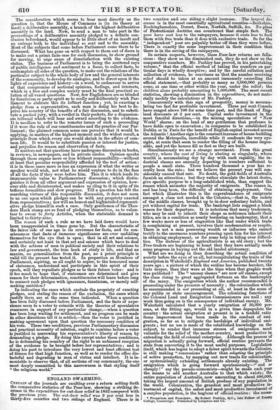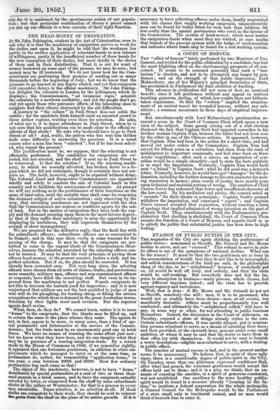ENGLAND SWARMING.
Critranr of the journals are exulting over a return setting forth the comparative statistics of the Poor-law, showing a striking de- crease in the expenditure for out-door relief in 1852 compared with the previous year. The out-door relief was 3 per cent less in thirty-five counties and two ridings of England. There is in two counties and one riding a slight increase. The largest de- crease is in the most essentially agricultural counties—Berkshire, Buckinghamshire, Dorset, Essex, Norfolk, Suffolk, &c. No gloss of Protectionist doctrine can counteract that simple fact. The poor have cost less to the ratepayers, because it costs less to feed them with free trade than it does with exclusive trade. So far the " independent" poor are palpably better off than they were before. There is exactly the same improvement in their condition that there is in the saving of the ratepayers.
In certain. respects, however, these Poor-law returns are falla- cious : they show us the diminished cost, they do not show us the comparative numbers. Mr. Pashley has proved, in his painstaking volume,* that the official method of taking the numbers on par- ticular days is wholly deceptive ; and by the careful collation and collection of evidence, he convinces us that the number receiving relief should be taken at an amount immensely exceeding the official statement,—that probably as many as 3,000,000 persons come, at one time or other within the year, under the relief ; the children alone probably amounting to 1,000,000. The most recent statistios, showing a diminution in the expenditure, do not mate- rially modify the calculations of Mr. Pashley. Concurrently with this sign of prosperity, money is accumu- lating too fast for profitable investment. Three per cent Consols have ranged above 100 for some time past, and the Bank of Eng- land discounts at 2 per cent. Capital seeks investment in the most fanciful directions,—in the mining speculations of "New World" shares ; on the land of any gentleman that professes to have fields open to excavation ; in companies to be established in Dublin or in Paris for the benefit of English capital invested across the Atlantic Another sign is the constantincrease of house-building around the Metropolis, incredible while it confronts the very eye- sight, at rents that seem to render the filling of the houses impos- sible, and yet the houses fill as fast as they are built. Simultaneously we see a strange movement. From this great country, where the cost of living is abating so singularly, where wealth is accumulating day by day with such rapidity, the in- dustrial classes are annually departing in numbers sufficient to people a small state. Three hundred thousand a year has re- cently been the rate; but we believe the presentyear will con- siderably exceed that rate. No doubt, the gold-fields of Australia furnish an attraction ; but they rather stimulate the latent desire, give specific purpose to a long-established wish, than suggest the reason which animates the majority of emigrants. The reason is, and has king been, the difficulty of obtaining employment. One fact which illustrates this is the superabundance of emigrants amongst a class not needed in the Colonies,—that is, the cadets of the middle classes, brought up to in-door sedentary habits, and yet without capital for trade. The bankrupt lists suggest a black reason for their departure. It is notorious that many tradesmen, who may be said to inherit their shops as noblemen inherit their titles, are in a condition so nearly bordering on bankruptcy, that a few weeks more or less of stagnation like that under which trade is complaining at present, involves their condemnation or respite. There is not a man possessing wealth or influence who cannot testify to the enormous numbers pressing upon him for his interest in obtaining employment, or for some help in tiding over difficul- ties. The distress of the agriculturists is an old story ; but the Free-traders are beginning to boast that they have actually made some progress in buying out the old landed aristocracy. What are we doing in thus describing the actual condition of society before the eyes of us all, but recapitulating the traits of the description in Wakefield's England and America, published twenty years ago ; a picture of which the outline has become harsher, the tints deeper, than they were at the time when that graphic work was published ? The " uneasy classes " are now all classes, except the class rising to great aggregated fortunes on the bankruptcy of the many. The emigration which the author recommended is proceeding under the pressure of necessity ; the colonization which he recommended is not proceeding at all, at least in the sense of any public or state encouragement. The colonizing functions of the Colonial Land and Emigration Commissioners are null : any work thus going on is the consequence of individual energy. Mr. Wakefield calculated that a yearly emigration of 30,000 per- sons, at the fitting age, would in a given time depopulate the country : the actual emigration at present is in a tenfold ratio Some improvement has been made in the conduct of emi gration, so far as to mitigate the hardships of individual emi- grants ; but no use is made of the established knowledge on the subject, to render that immense stream of emigration most valuable for the relief of the mother-country, most productive in extending the field of colonial enterprise. Although the process of migration is actually going forward, official routine prevents the state from converting it to the most useful purposes. Legislation itself, which has begun to adopt a fairer spirit towards the Colonies, is still making " concessions " rather than adopting the principle of active promotion, by mapping out new tracts for colonization, or systematically extending settlements already existing. The emigration which is going forward spontaneously—" and so cheaply " say the pseudo-economists—might be made each year the means to add another Australia to that which exists ; the entire population of Australia, now amounting to about 400,000, taking the largest amount of British produce of any populationin in-
vestment world. Colonization, the grandest and most productive n-
vestment of capital, the safest and most productive investment of a surplus population, is the bugbear of official routine : the neces-
• Pauperism and Poor-laws. By Robert Pashley, late Fellow of Trinity College, Cambridge. Published by Longman and Co.
sity for it is confirmed by the spontaneous action of our popula- tion; but that particular confirmation of theory a priori cannot yet stir up our officials to a true exercise of their right function.



























 Previous page
Previous page